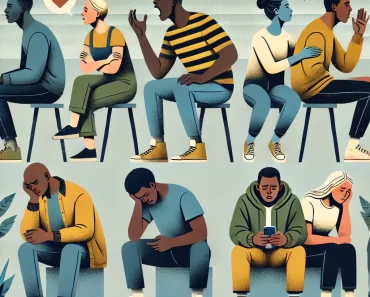Learning how your childhood affects your adulthood relationships helps you better understand yourself for a healthier, happier relationship with your soulmate.
Although you may be doubting yourself, questioning why your relationships fail, and ready to give up on your search for a soulmate, consider that meeting soulmates is actually part of your journey to becoming your true self. The many people we meet during our lifetime are often soulmates. In fact, you can meet many soulmates in your lifetime, but that doesn’t necessarily mean that it’s always going to be a blissful romance.
Soulmates are meant to meet each other in order to both learn and evolve spiritually but we sometimes get stuck in a cycle of making the same mistakes and destroying relationships. This is often because we don’t learn from the past and continue to fall into self-destructive behavior patterns that we picked up in childhood and they’ve remained with us. These behaviors affect how we treat ourselves and others, yet we’re often unaware of the roots of these behaviors.
So here are some behaviors to look out for and try to overcome, knowing that they are often programmed perceptions, rather than beliefs based on any real facts.
Common Reasons Why Relationships Fail

A major reason relationships end on a sour note is due to behaviors and emotions that we’ve unconsciously learned during our childhood. If you’ve ever questioned whether your childhood affects your adulthood relationships, then you’re on the right path. Often issues occur during pivotal periods in childhood development due to attachment disruptions and dysfunctional or unhealthy caregiver behavior.
Looking back on your childhood can often help you to better understand your adult behavior and attachments. The way you’ve been brought up and treated through childhood has helped to shape your view of the world and how you relate to yourself, interact with others, and how you form relationships. Unless you take the time to understand yourself better and recognize these behaviors, you will likely get stuck in a repeat cycle and continue these patterns well into adulthood and within all of your relationships.
When speaking with my clients about why their relationships fail, these common issues continually crop up:
- Lack of trust
- Fear of commitment
- Fear of rejection
- Dependency
- Lack of communication
- Constant arguing without resolve
- One trying to change the other
Seven behaviors to watch out for and where they come from
Many of our emotions and behaviors in our adult relationships are coping mechanisms that we developed during childhood when faced with either traumatic situations or irrational fears. To be able to enjoy healthy relationships and create good habits as an adult, it’s so important to work on understanding and recognizing these triggers in yourself, so that you can avoid falling into any self-destructive patterns of behavior.
Here are seven behaviors to watch out for with explanations of the behavior’s possible origins:
Lack of trust

When you don’t feel like you can trust people around you, and think that by being vulnerable, you’re opening yourself up to being hurt by others.
This often comes from a fear of abandonment due to caregivers that were either unreliable or abandoned you or your needs in some way, leaving you feeling distrustful of anyone that cares for you.
Fear of commitment

Often based on a fear of abandonment, you’re afraid of getting too close and so to keep yourself safe, you avoid making future plans and settling down.
Similar to a lack of trust, fear of commitment is based on a fear of being abandoned. By avoiding settling down, you feel safer in the knowledge that you can leave the relationship easily.
Fear of rejection

Also based on a fear of abandonment, if you have a fear of rejection, you may cling to others because you’re afraid of them leaving.
This can also relate to anxiety and low self-worth. The fear is linked to memories of feeling rejected or abandoned by your caregivers during your childhood.
Dependency

When you don’t feel confident and capable of leading your own life, you are unable to make decisions without the aid of someone else.
This is often linked to low self-belief and different forms of anxiety stemming from childhood abandonment or a dysfunctional upbringing.
Lack of communication

This is the inability to repair a relationship after conflict or address any issues in the relationship. You might even pretend that nothing happened or give your partner the silent treatment.
Lack of communication often comes from growing up in a household where caregivers either always argued or avoided arguing. In either of these situations, a child isn’t shown or taught the necessary skills to have healthy communication and manage conflict.
Constant arguing without resolve

If you’re unable to communicate healthily and manage conflict, then you’ll likely struggle to look for compromises and solutions during conflict in your relationship.
Although it’s the other end of the spectrum, constant arguing has similar routes to a total lack of communication. If you’ve not had a chance to learn how to communicate in a healthy way, you might not have learned how to manage or resolve conflicts amicably. These behaviors can also be based on abandonment and having had to rely on yourself as a child.
One trying to change the other

This behavior manifests in trying to “fix” your partner and trying to change them to fit your ideals of what a perfect partner should be like.
Usually, trying to change someone is linked to a trauma response that comes from believing that you should do the best with what you’re given, since you couldn’t change who your caregivers were. This is also a way to prove to yourself that you are worthy and able to have a relationship.
By working on recognizing these behaviors and stopping them in their tracks, you’ll dramatically improve the chances of having a healthy, long-term, and happy relationship with your next soulmate.
If you feel like you are ready and in a good place to start looking for your next soulmate, I can help you to recognize the next partner on your journey by drawing you a soulmate sketch. Although It may not necessarily indicate your next soulmate for life, see it as divine intervention, putting you on the path to meeting someone, even fleetingly, that will help you to learn and grow into the person that you’re meant to be.






